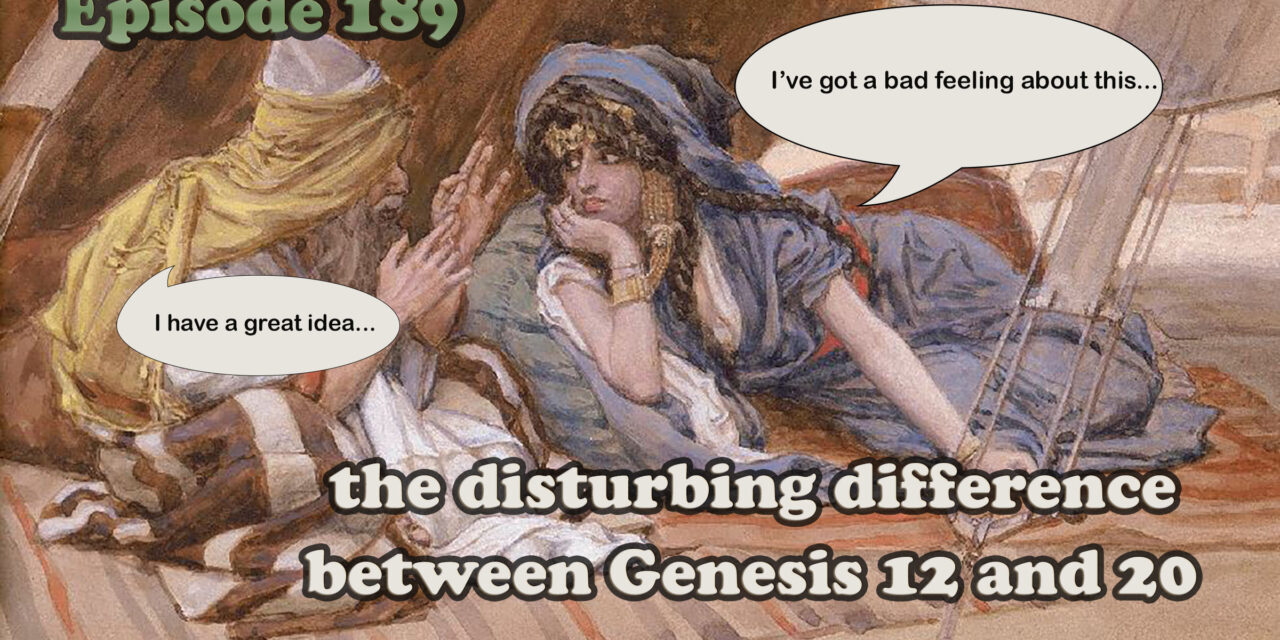I am about to begin teaching the kids about Genesis 20 and 21 over on Context for Kids and so it is time to explore the disturbing implications of what is said in Genesis 20 back to what wasn’t said in Genesis 12 when Pharaoh took Sarai.
Podcast Home if you can’t see the player.
A lot of folks like to look at Gen 20 as Gen 12 part 2 but there is a lot more going on, and not going on, here—than there was in the brief account of Pharoah, Sarah, and Abram. As I was not yet doing these adult supplements when I taught the kids that portion of the Bible, this will be a double dose of Abram (and Abraham) and his problem with habitual lying whenever he feels endangered in certain ways, and how it puts others at risk. As such, there are a wealth of lessons here for kids because we have all been there, right? Scared to death and out pop the lies to get ourselves out of trouble. Oh, just me? Uh huh. Right. These two chapters teach us the difference between, “oops I was scared and I lied” and “I have a policy of always telling this lie wherever I go because other people don’t fear the Lord.” Anyone can panic but not everyone has a plan in place to lie that gets in the way of their trusting God and His promises—which can’t be fulfilled if Abraham truly needs to fear for his life. And because Abraham is an established liar, we see in Gen 12, 20, and 21 that his reputation for deceit follows him around and even we readers find ourselves wondering if his other claims are true. Is Sarah really Abraham’s half-sister or was this just another lie designed to help him save face with a foreign king? Let’s look at the context and the text to see what it does and doesn’t say and how this all fits together with ancient Near Eastern legal codes. That way, when kids ask you the hard questions, you won’t have to blow them off with easy answers. Let’s read the Bible the way it was written—unapologetically showing everyone’s warts and designed to make God and God alone the hero of the entire text.
Hi, I am Tyler Dawn Rosenquist, and welcome to Character in Context, where I teach the historical and ancient sociological context of Scripture with an eye to developing the character of the Messiah. However, now I am exclusively working to teach and disciple kids and their educators, so this portion of my ministry is currently devoted to teaching adults how to teach kids by making sure that we are supporting their growth and faith in the Messiah instead of hijacking it and to also able to answer their hard questions about the text instead of blowing them off. Kids are our full-blown brothers and sisters in Christ. Let’s stop sidelining them with cute stories designed to make the people in the Bible look like perfect heroes and instead teach kids how to take Yeshua/Jesus seriously as the only true hero of the Bible and the greater Moses, greater Temple, and greater Prophet whom Matthew tells us He is. So, from now on, this is a satellite ministry of Context for Kids, which has become my primary ministry. Lots for adults to learn still, focused on equipping adults to equip kids and also to teach people new to context studies. I still have a ton of more advanced teachings for grownups at theancientbridge.com and on my YouTube channel, and I think that most of the listeners to Context for Kids are probably grownups anyway so you can catch me there as well if you enjoy crawling through Genesis at a snail’s pace. I also have curriculum books and all that jazz available on Amazon. All Scripture this week is from the CSB, the Christian Standard Bible, unless I say otherwise.
So, at the end of Genesis 12, Abram and Sarai travel to Egypt because of a terrible famine in Canaan. They and their livestock end up down in Egypt which is almost always abundantly fertile and even famously so during the days of the Roman Empire where Egypt was known as the breadbasket of the world—only not in English. Something in Latin or Greek instead. Abram tells his beautiful sixty-five-year-old wife Sarai to do him the favor of telling everyone that she is his unmarried sister so they won’t be tempted to kill him when they take her for themselves. And yes, this is worrisome. The taking and even raping of Sarai is the expected outcome but, as Abram explains, at least it will go well for him if and when it happens. How romantic, right? And that’s exactly what happens. Sarai is taken into Pharaoh’s house and Abram is paid handsomely with money and critters and slaves as a bride price. As her purported brother, he owns her and will therefore profit off of her marriage. This is just life as normal in the ancient Near East and as I tell the kids, this is the world God decided to change and this is just one of many reasons why.
Some unspecified time later, God lays down the law with Pharaoh. But before that, He strikes down the household of Pharoah with plagues (sound familiar?). Somehow or another, God communicates to Pharaoh the reason for the plagues—he has taken another man’s wife. Although this is actually normal on real crime podcasts and 20/20 and all that, all over the ancient Near East (from Egypt to Babylon) this was considered a very great sin. It wasn’t just adultery, as we would see it, but theft of property because women weren’t allowed to control their own sexuality. It was very much a taboo—which is why it was more common for a husband to be killed before taking his now widow. That, I suppose, was okay in the eyes of some. Hey, every culture has strange rules! But as soon as Pharaoh learns what he has done, he gives her back and exiles them from Egypt. But Abram leaves far richer than he was when he entered the country. And this sounds like it was a quick thing but let’s take another look. There was enough time for multiple plagues to be inflicted on Pharaoh and his household and we aren’t ever told what they are. God unleashes chaos upon the Egyptian elites in a way totally at odds with his later treatment of the household of Abimelech the Philistine king, which was incredibly merciful even though Abimelech’s sin appears to be the greater of the two. We’ll come back to this later because it will be important to understanding both stories and how they are the same yet also very different.
Twenty-four years later, Abraham and Sarah (now both renamed by God), have moved from Hebron to their new base of operations in the Southern Levant near the Egyptian border—yes, Egypt again even though it isn’t explicitly mentioned. Here they encounter a king named Abimelech whose name means “my father is king” and this may be a patronym or a throne name for the dynasty. A patronym is something very familiar to us—like bar Jonah would be “son of Jonah” or bat Jonah would be “daughter of Jonah” in Aramaic, the Hebrew-ish Semitic language spoken by the Jews during and after the exile. Names common today would be Fitzpatrick (son of Patrick) or Ivanoff (meaning “of Ivan”) and also last names like Peterson, MacDonald and that sort of thing. They all go back to an ancestor and not to a person’s father anymore like it would have in Bible times. So, maybe Abimelech means son of Melek (my father is Melek) or maybe it is a name that all the kings of the Philistines there used because it more likely means “my father is king.” We aren’t used to throne names anymore because the only well-known monarchs in the western world now—Elizabeth and Charles—broke that tradition and used their real names. Queen Victoria’s real name was Alexandrina, for example. Elizabeth’s dad was actually an Albert before he became George VI. Augustus Caesar’s real name was Gaius Octavian.
But when they travel to Gerar and Abimelech takes Sarah, there is no mention of a payment to Abraham. It really seems as though Abimelech simply seizes her, not because she is beautiful because this claim isn’t made again and she is now eighty-nine years old, but perhaps to force an alliance with an affluent and powerful man in Canaan or, less likely, as a ransom situation enacted against a rich foreigner. Abraham assured Abimelech that she was his sister and he had her taken and brought to him. No negotiations. No bride-price. No nothing. This isn’t like the first situation where there are plagues and yet, God handles this very severely anyway. We find out later that no one in his household can have any babies for some reason—and that somehow God has rendered Abimelech unable to sexually approach Sarah. So, it is likely that all the men were rendered impotent. Now, I was always taught that this was so that no one could question the parentage of Isaac and although this is undeniably true, there is something else not being said that reflects back on Genesis 12. Movies and storybooks present this idea that Sarah was undefiled by Pharaoh but that is simply wishful thinking. We really don’t know. There is nothing in Genesis 12 to suggest that throughout the plagues, Pharaoh was unable to approach the incredibly beautiful Sarai. Nothing at all is said and there is also no mention of vindication of her honor. Pharaoh is explicit in saying, “I took her as my wife” and that more than implies a consummation of the marriage. Sarah was sold by her husband for an exorbitant fee and it was only through God’s intervention that she was released. In fact, when we look at the third parallel situation in Gen 26, a future ruler named Abimelech almost falls into the same trap when Isaac lies about the identity of Rachel. Abimelech rebukes him, saying, “one of us could have easily slept with your wife, and you would have brought guilt upon us.” Abimelech was alarmed and frightened because, as I have mentioned previously, adultery—intentional or not—was considered a great sin by all of the ancient Near Eastern world. No wonder Pharaoh was furious and especially if he had slept with her, as would be normal and expected. There were no protests of Pharoah to God or to Abraham that he was innocent of the crime of adultery, only anger that he had been led into this situation by Abram’s deception.
This time, however, God protects Sarah and didn’t allow her to be violated. And we may hate the possibility that she was raped by Pharaoh, but this is the Bible and not Disneyland. This was a harsh, cruel world where the women weren’t treated as humans but as property—except by God who even called Hagar by her name when no one else would, and who called a woman to judge Israel as a prophet, etc. There’s a reason why God had to make changes. And it had to start with changing Abraham first and foremost.
Back to Abimelek and his dilemma. God comes to him in a dream after some time of sexual impotence throughout his household, and tells him he is a dead man because of Sarah. He’s committed the great sin of wife stealing—and the only reason he isn’t dead yet is because he didn’t know. But the text does seem pretty clear that he strong-armed his way into this “marriage” with Sarah. He took her—or at least he sent his men to do so. He had the power to bypass the social contractual niceties and so he did. Possessing Abraham’s sister would gain him an important ally in a land where they were definitely in the minority, as the Philistine nation wouldn’t formally move en masse to the land of Canaan until the 12th century BCE. At most, Abimelek was “king” or big man on campus of an outpost, small colony, or a trading hub. And God did have mercy on him and didn’t allow Sarah to be violated because of Abraham’s lies. God’s promises now specifically include Sarah as the mother through whom He will raise up a covenant people. For Abraham to still be doing this nonsense now that a child was promised to both of them is shocking. And it is supposed to be.
Pharaoh, I believe, is actually plagued because he was having sexual relations with Sarai but Abimelech is only guilty of the lesser crime of kidnapping another man’s wife. Pharoah actually entered into this innocently, but the crime was greater. Abimelech was a kidnapper, but nothing more than that was allowed to happen because of the imminent conception of Isaac. And I suppose the real miracle here is that Sarah was willing to have relations with Abraham after this. These days, we would be telling her to file charges against them both and finding a good lawyer. I mean, these are major crimes when we stop to think about it. When we just read through these chapters like they are ordinary, we have to remember that if we were reading this in the newspaper we would be outraged and appalled. Perhaps that is the tragedy of living in a world where we have lost the ability to treat the Bible like a historical narrative about people who often went through hell on the way to bringing forth the Messiah.
Well, Abimelek was furious and called together all of his councilors and they were terrified too because this was something that just wasn’t done and they were terrified that their whole people would be punished. Of course, in our eyes, Abimelek wasn’t at all a righteous dude in that he did kidnap Sarah and forced her into marriage but at the time, he was just doing what he had the right to do in his own land to foreigners. When we later see the laws given at Sinai and then outside the promised land in Deuteronomy, there are specific regulations about how foreigners are to be treated by God’s people but at this point, that was far in the future. So, we have might makes right and all that nonsense. It was the way the world thought pre-cross. As such, Abimelech could claim a clear conscience in that he hadn’t been aware that he was about to commit adultery. God tells Abimelech to give her back to Abraham because he is a prophet and that he will pray for the restoration of potency to Abimelech’s household. Abraham, despite his deception, is the legally wronged party in an attempted adulterous act and he must be appeased. As a prophet, he is an intercessor and his prayers for Abimelech will be heard—no matter how messed up it seems to us. We like to believe that God wouldn’t ever answer the prayers of someone who would lie like that, but there we go. Abraham isn’t perfect, just chosen. He’s part of the plan to rescue humanity and no matter whom God picked, there were going to be serious issues. Abraham was raised in Ur of Babylonia, and that was his context. Apart from late-date Rabbinic legends that have him learning from Shem, we have no reason to believe he wasn’t every bit as much an idol worshiper as his father Terah—as we learn in Joshua 24:2. He was raised normalizing ancient Near Eastern laws of conduct, as we saw in chapter 16 and we will see again in chapter 21 when Sarah asserts her ANE rights of manumission to get rid of Hagar and Ishmael. He had a long way to go to get here—not excusing him, just pointing out the reality of where Abram started out and Abraham ended up at the end of chapter 22. The story of Abraham is a journey and usually not a pretty one.
Abimelech, however, would have seen nothing strange about a deity who favors certain people and protects them “just because.” The gods he knew were fickle and petty and unpredictable and he was likely just relieved that this one had an exit strategy in place for him. So, after meeting with his council, Abimelech took Sarah back to Abraham and let him have her and gave him an earful about his sins against the Philistine people who were suffering because of his lies. And here’s where the story gets weird and frustrating because Abraham just starts making excuses for his behavior that are much worse than just apologizing—which men in honor/shame cultures weren’t really big on doing. He freely admits to having a pre-existing plan while travelling to pass Sarah off as his sister because “you dudes are all heathens who don’t fear God.” Which is ironic since Abimelech obviously does fear God a lot ever since God spoke to him. But then, we have this mystery because Abraham is claiming that Sarah really is his half-sister—a detail that we don’t find in the original genealogy given to us in chapter 11. Is Abraham being honest here or is it just another lie? We absolutely have no idea. We weren’t told that Terah had more than one wife and whether Abraham’s mother had died before he turned ten, and maybe Terah married Sarah’s mother. Or if he had multiple wives at the same time. This statement is incredibly puzzling because with Abraham’s track record in this particular area, we have no way of knowing if he is telling the truth or lying. What we do know for sure is that Abimelech doesn’t trust him—that will become more apparent in chapter 21.
Abimelech now does what he should have done in the first place instead of kidnapping Sarah—he pays Abraham the equivalent of a high bride-price to appease him, and then he additionally pays Abraham a thousand pieces of silver. That’s 25 lbs. of silver. As he hands over the money, this is the gist of what he says to Sarah, “Look, I am giving “your brother” this money. This is your vindication that absolutely nothing happened between us and you haven’t been defiled.” Abimelech even allows Abraham to settle wherever he wants in the land of the Philistines. Abimelech is in a pickle—he has to do everything he can to make Abraham happy, whether he trusts him or not or likes him or hates him. If Abraham doesn’t pray for them, they will never have children and they will die off. That was a fate worse than death in the ancient world.
I want you to see some parallels between Abimelech and Sarah and the Philistines and the Ark of God in I Sam 5. The sinful priests Hophni and Phineas foolishly and presumptuously took the Ark of the Covenant into battle against the Philistines and God wasn’t about to go along with them to fight. So, the Philistines captured the ark and placed it in the Temple of Dagon, their grain god. Yes, I know about the fish god stories but from archaeology we know a lot about the worship of Dagan and he was a grain god, which makes sense when they later place the Ark out in a grainfield hoping that Dagan would be stronger there and he wasn’t. So, we have this “kidnapping” of the Ark and bringing it into the royal sanctuary of Dagan just as Sarah was taken into the royal residence of Abimelech. Abimelech and his house suffers from impotence, so he is rendered ineffective. Dagan falls twice and loses his arms and head, and was thus rendered ineffective. The Ark is finally returned to the people of Israel along with golden rats and tumors as tribute, and critters, on a wagon as an act of national repentance. Sarah is returned along with money, slaves, and critters as an act of community repentance.
Abraham responds by praying for Abimelech and his people so that they will be able to have children again—and we learn that not only was Abimelech himself afflicted but so were the women of his household. There is a recurring message here that consequences of the sins of men fall heavily on the women in their lives. But then, in Exodus 34 when Yahweh tells Moses that He visits the sin of those who hate Him to the third or fourth generation, we shouldn’t understand this as future generations being doomed but instead a commentary on the reality that they were living in a time when each household contained three or four generations living as a unit. What fell upon one would harm the entire house. This isn’t God being vindictive but simply a directive to people that when they sin grievously against God, actually hating Him (which meant working against Him), the people in their lives will all suffer because of it. Anyone who has grown up in a house of abuse, addiction, or whatever, understands that it’s never just one person suffering—everyone does. This is what we see in the houses of Pharoah and Abimelech—and David. Excepting with David, the sword never leaves his house throughout the generations, leaving His house needing to be renewed and the curse undone through Yeshua/Jesus at the Cross.






















so good! ‘What if’ Abram said Sarai was his sister to explain why she was traveling with him and his mob.